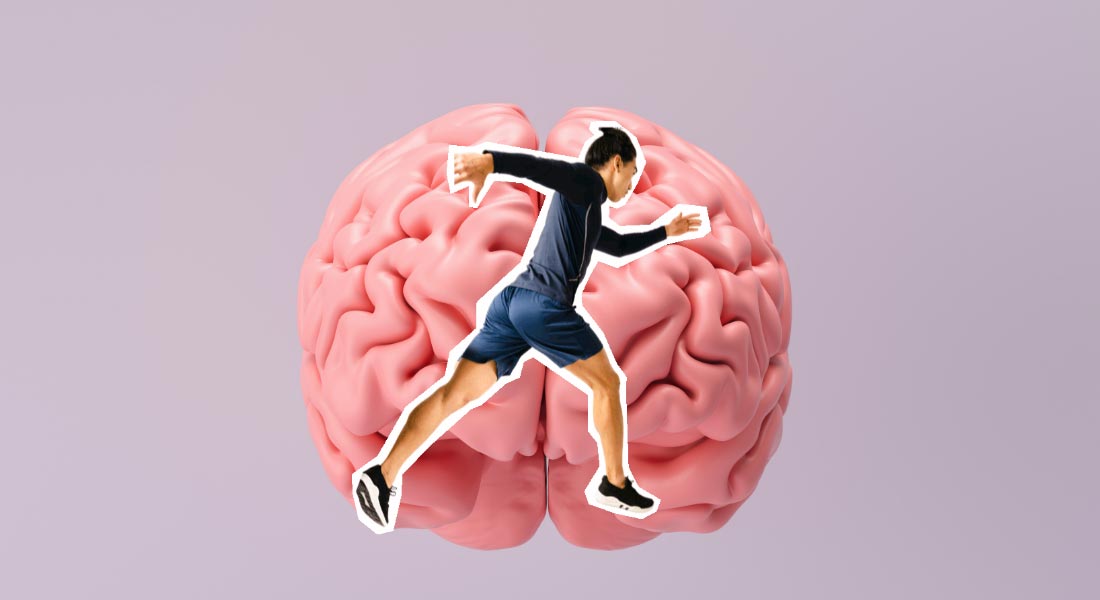Activity is important for your brain – and for the prevention of Alzheimer's
Exercising and maintaining a healthy lifestyle are some of the ways in which we can keep our blood vessels flexible, enabling them to retain the ability to pump blood around the body. This is not only important for the body, but also for the brain. A new study suggests that a healthy heart may help prevent Alzheimer's – and this gives hope for new treatments.

Maintain a healthy diet, exercise and avoid too much alcohol. Does that sound familiar? Most likely. Because this recommendation on how to live a healthy lifestyle can be traced far back in history.
Now there is another reason to adhere to the recommendation. Research from the University of Copenhagen shows that a healthy lifestyle that preserves the blood vessels' ability to contract and expand increases the flow of cerebrospinal fluid in the brain. The findings may potentially help prevent brain diseases such as Alzheimer's.
‘When, for example, you exercise and maintain a healthy diet, the blood vessels retain their flexibility. This means that they can easily contract and expand – what we call vascular dynamics. And this is where it gets exciting, because many neurodegenerative diseases start with a reduced function of precisely the vascular dynamics’, says Stephanie Holstein-Rønsbo, Postdoc at the Center for Translational Neuromedicine at the University of Copenhagen.
The vascular dynamics can drive the cerebrospinal fluid forward through the glymphatic system. This system helps the brain to expel the waste products that accumulate when there is activity in the brain. And if the system does not function optimally, it increases the risk of, among other things, Alzheimer's and dementia.
‘When we get older, it is completely normal for microvascular changes to occur so that our blood vessels become stiffer. The elasticity decreases, meaning that the vessels cannot expand and contract as well as before. But by staying active, we are able to maintain a healthy vascular system so that the blood vessels stay flexible and retain the ability to drive forward the cerebrospinal fluid – and in this way we may be able to prevent diseases such as dementia and Alzheimer's’, says Stephanie Holstein-Rønsbo.
The study was conducted on mice, but, according to the researchers, there is a good chance that the results can be transferred to humans.
Similar studies have already been conducted in humans, showing that changes in blood volume may shift the cerebrospinal fluid. This means that when the blood vessels expand, they push away the cerebrospinal fluid’, says Stephanie Holstein-Rønsbo.
The blood vessels are the most important
The first results did not show whether it was the neuronal activity, i.e., the activity in the neurons in the brain, or the increased blood supply that push the cerebrospinal fluid forward. The researchers therefore had to arrange experiments that separated the neuronal activity from the blood vessels – using a very specific method.
‘The very important thing we have done in this study is that we activated the blood vessels independently of the neurons and thus showed that it is the blood vessels that can drive forward the fluid, independently of the neuronal activity. It is an important discovery that we were not expecting’, says Professor Maiken Nedergaard, one of the researchers behind the study.
When the brain is activated, more blood flows to the activated area of the brain. This is called functional hyperaemia. The new findings indicate that the primary task of functional hyperaemia is to increase the cleansing of the brain.
By using optogenetics, a light-sensitive ion channel, you can activate the blood vessels by shining a light on them. In this way, the researchers could sort out the neurons in the brain and only look at the function of the blood vessels.
‘That way we could tell which part of it is more important: whether it is the movement of the blood vessels or the activity of the neurons that causes the cerebrospinal fluid to drive forward’.
The researchers were thus able to establish that it is the blood vessels that drive the brain fluid forward – and that it is precisely this process that you may boost by having a healthy heart which will pump blood around the body in the best possible way.
One more reason to take good care of your body
Right now, there are no effective treatments for Alzheimer's and dementia. Therefore, the researchers' findings are an important step forward toward an understanding of the diseases and the treatment options.
‘As a preventive element, this will be in line with what already is true: that people should be advised to lead a healthy lifestyle. But now, there is one more reason as to why this is beneficial, and that might mean a greater incentive to treat your body well’, says Stephanie Holstein-Rønsbo.
However, the research is also important in terms of discovering new treatments in the future, and, unfortunately, there is a great shortage of treatments.
‘A dream scenario in relation to the treatment of Alzheimer's would be if you could diagnose early in the process. Then there is the greatest probability that you can make a difference for the patients. One could imagine a form of stimulation treatment that activates the blood flow in the brain and increases the cleansing – so that the waste products do not pile up further’, says Stephanie Holstein-Rønsbo.
The study has been published in Nature Neuroscience and can be read here.
Contact:
Postdoc Stephanie Holstein-Rønsbo
stephanie@sund.ku.dk
+45 42 33 73 93
Professor Maiken Nedergaard
nedergaard@sund.ku.dk
+45 93 56 53 13
Journalist and Press Consultant Sascha Kael Rasmussen
sascha.kael.rasmussen@sund.ku.dk
+45 93 56 51 68
